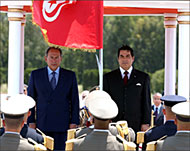Tunisian president set to stay in power
Two opposition parties have called on Tunisians to boycott the up coming presidential vote.

The Democratic Progressive Party and the Democratic Forum for Labour and Freedom both say taking part would open the way for another president-for-life.
Elections, contested by Tunisian President Zain al-Abidin bin Ali and three other candidates from tiny legal parties, are to be held on 24 October in the North African country which has won praise from the US for participating in the “war on terrorism”.
However, the ruling party chief says the expected re-election of bin Ali, already in power for 17 years, does not signal the return to president-for-life rule but is needed for the country’s prosperity.
“Those who allege there would be a presidency-for-life rule are talking nonsense because the revised constitution sets an age limit [of 75 years] for a presidential candidate,” said Ali Shauch, secretary-general of the ruling Constitutional Democratic Rally (RCD) party.
Bin Ali, now 68, took over in 1987 when president-for-life Habib Burqaiba, the founder of modern Tunisia, was declared senile and incapable of ruling by a team of doctors.
Sole candidate
|
“Those who allege there would be a presidency-for-life rule are talking nonsense because the revised constitution sets an age limit [of 75 years] for a presidential candidate” Ali Shauch, |
He stood for election as the sole candidate in 1989 and 1994 and was re-elected in 1999 with 99.5% of the popular vote despite the introduction of multi-party politics.
Human rights groups called the vote a sham.
“Bin Ali eradicated the presidency-for-life from the fundamental law,” Shauch said in a recent rare interview.
A 2002 referendum on a new constitution allowing bin Ali to theoretically stay in power until 2014 if he also won the next poll, and which gave him lifetime immunity from prosecution, was approved by 99% of votes cast.
Critics say Tunisia is a police state with a veneer of formal democracy and argue that most Tunisians only hear about opposition figures when they praise bin Ali’s leadership.
The country’s only independent human rights group accuses the government of routinely beating dissidents and rights campaigners and of muzzling the press.
Price of stability
Some Tunisians say the country’s political future has improved from the grim outlook towards the end of Burqaiba’s rule.
 |
|
Rights groups say Tunisia’s |
Gross domestic product jumped to 35.1 billion dinars ($28.13 billion) this year from 7.16 billion dinars 17 years ago.
Life expectancy reached 73.2 years in 2004 from 67 in 1987 and per capita income rose from 960 dinars to 3540 dinars this year, according to government data.
Analysts and diplomats say the challengers have almost no chance of beating bin Ali, who has a very tight grip on power.
Parliamentary elections will also be held on 24 October and the ruling RCD, which controls 80% of the chamber, is again expected to win most of the seats.